Back to blog
Website Builder vs Custom Website - 10 Key Differences
Explore the pros and cons of website builder vs custom website to find the best fit for your goals, timeline, and business growth needs.

Jul 29 2025
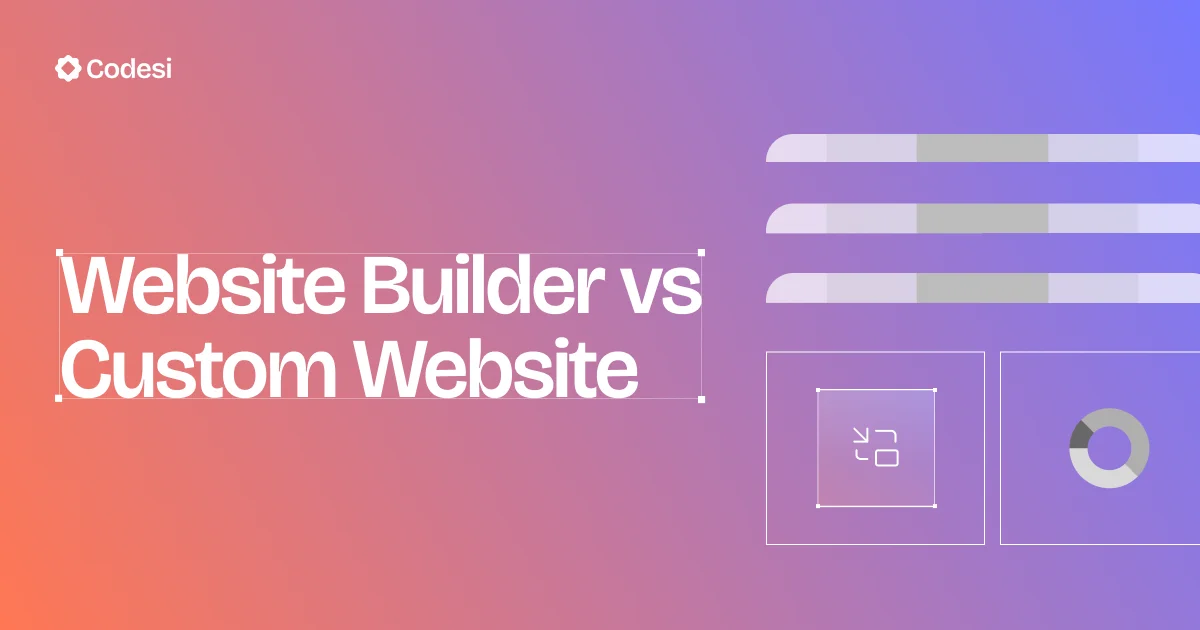
According to Sitebuilder report, by 2025, low-/no‑code tools are expected to power 70% of new enterprise applications, and over 18 million live sites already run on DIY website builders.
That's no surprise, since AI website builders let you launch in hours, making them a go-to for startups, solo founders, and service businesses that need to get online fast.
Custom websites, however, remain the gold standard for companies prioritizing long-term growth, branding precision, and advanced integrations.
So, in the website builder vs custom website debate, who wins?
In the following sections, we'll break down 10 essential differences between website builders and custom websites, and help you decide which approach matches your goals.
What Is a Website Builder?
A website builder is a self-contained platform that allows anyone, regardless of technical skills, to launch and maintain a website. It combines design, hosting, domain setup, and maintenance in one streamlined system.
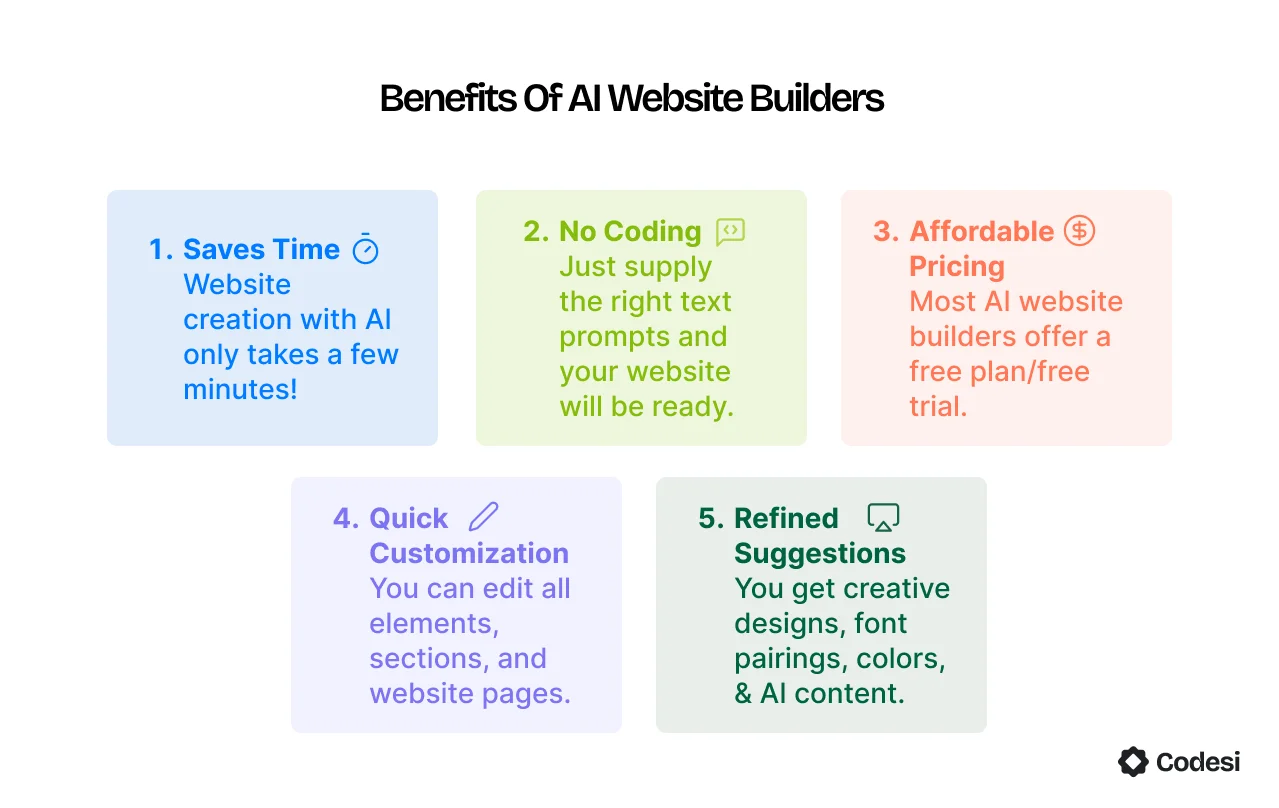
In 2025, the global website builder market is projected to be worth around $2.2 billion, growing at a 6–7% annual rate through 2033.
What Is a Custom Website?
A custom website gives you complete control from the start. Professional developers and designers build websites from scratch or with flexible frameworks to align precisely with your goals.
They shape every layout, feature, and function around your business, moving through structured phases: planning, design, development, testing, and deployment.
Website Builder vs Custom Website: 10 Key Differences
Below is a direct comparison of a website builder vs a custom website across 10 essential areas, followed by a detailed look at how each one stacks up:
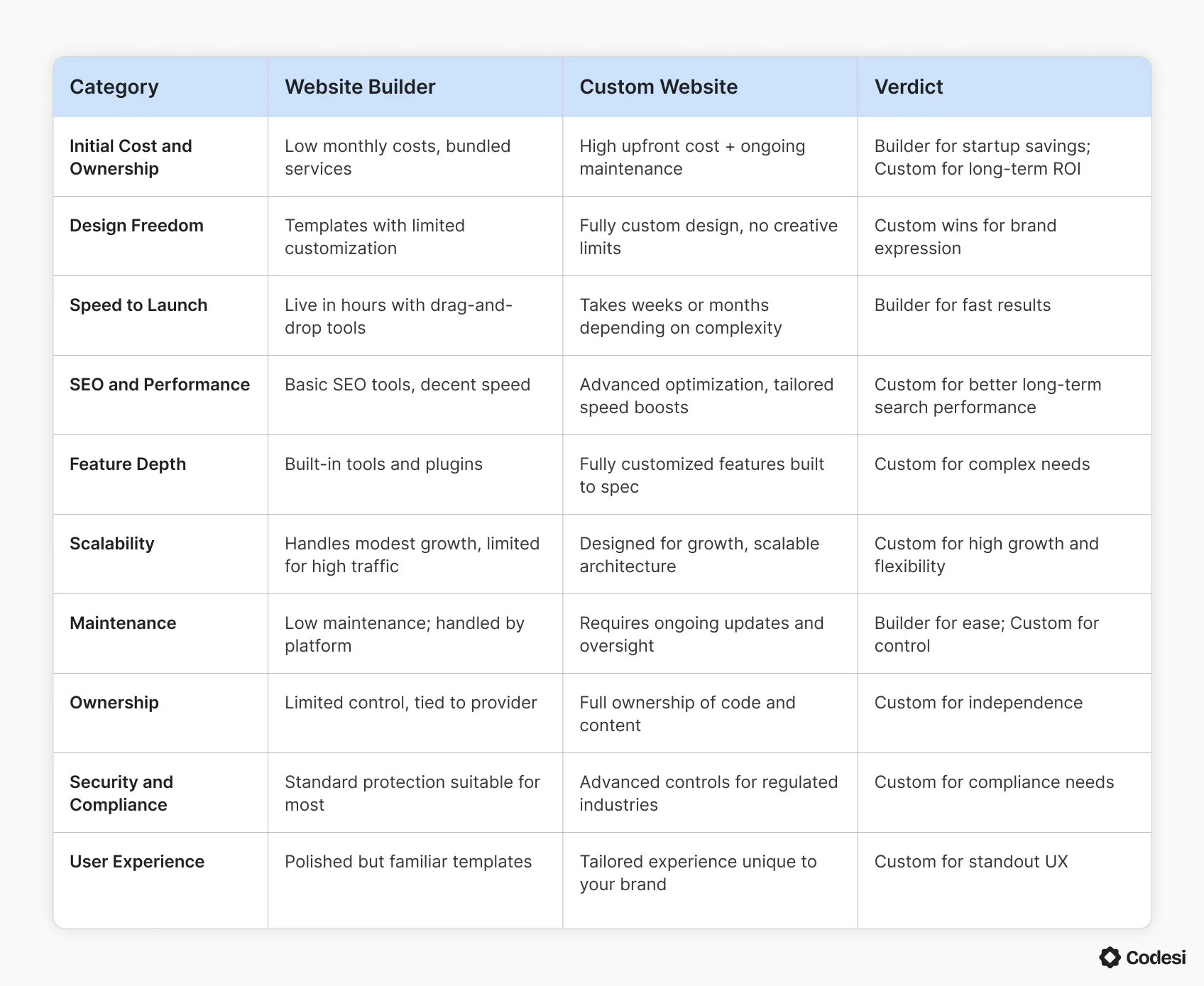
1. Initial Cost and Total Cost of Ownership (3-Year Horizon)
Website Builder:
Website builders offer transparent, all-inclusive pricing that eliminates the complexity of managing multiple vendors. Most platforms provide comprehensive packages for $10-50 monthly, combining hosting, professional templates, and ongoing support in one streamlined solution.
Custom Website:
A custom-built website requires a larger initial investment, with prices typically starting at $2,000 and scaling well beyond $50,000, depending on complexity. Additional costs include hosting, maintenance, and updates.

Verdict:
Website builders offer streamlined pricing models. Custom websites win on long-term value and ROI.
2. Design Freedom and Customization
Website Builder:
Most builders offer a library of pre-designed templates optimized for speed and ease. These are easy to modify, but they are limited in flexibility.
The result is often a site that looks polished, but not unique.
Custom Website:
With a custom approach, there are no creative restrictions. Designers and developers collaborate to bring your brand vision to life through a distinctive digital experience.
Every page, interaction, and animation is intentional and aligned with your business identity, delivering a website that feels original and high-end.
Verdict:
If visual identity and user experience are core to your brand, custom websites are the clear winner.
3. Speed to Launch
Website Builder:
When it comes to getting online fast, website builders are unmatched. With pre-built templates, drag-and-drop editors, and AI-assisted setup flows, you can move from idea to live website in a matter of hours.
This immediacy is a significant advantage for startups validating an MVP, consultants who need a quick portfolio, or brands launching a time-sensitive campaign.
Custom Website:
Custom development is a more deliberate and layered process. Depending on complexity, a custom website can take anywhere from four weeks for a basic build to several months for a fully featured platform.
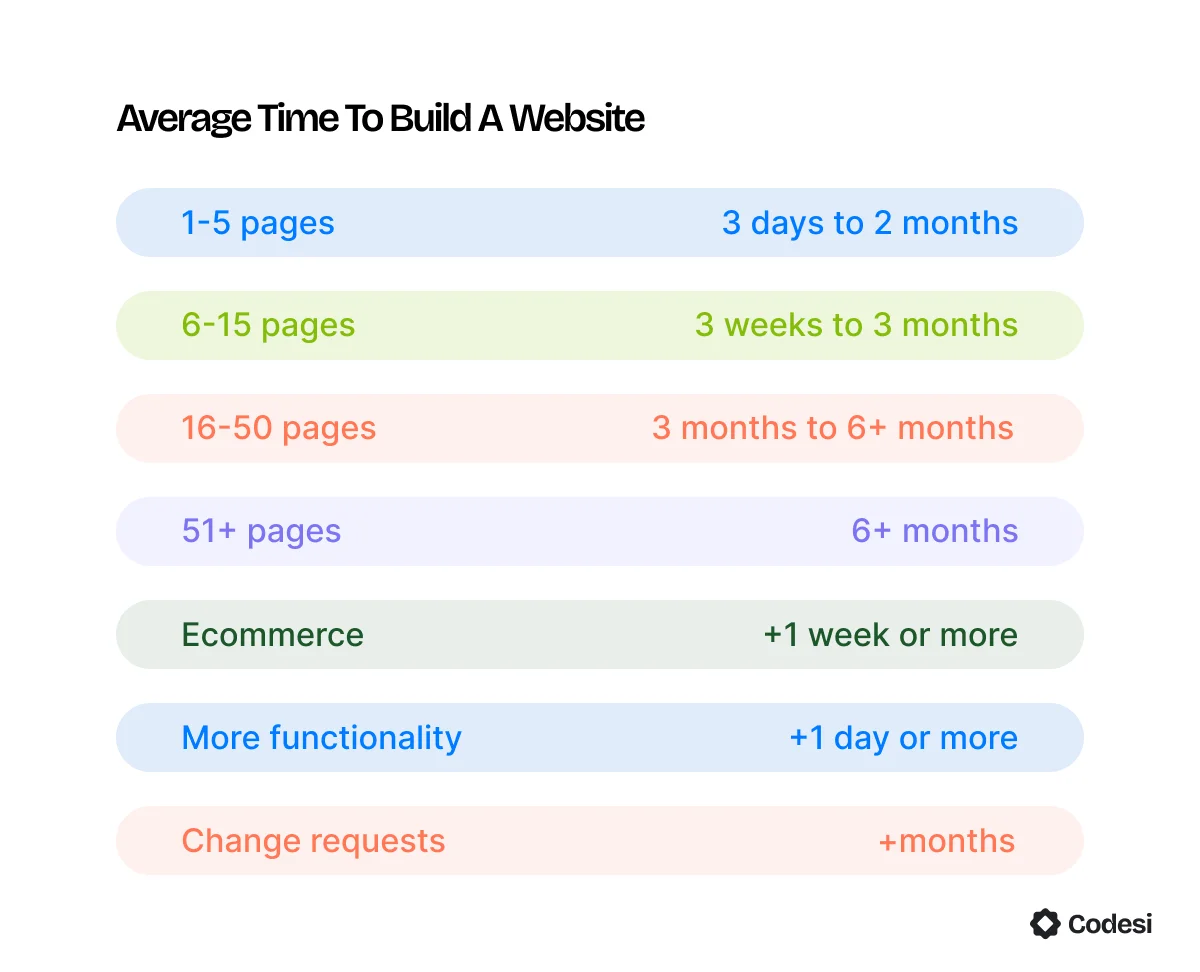
Verdict:
Website builders clearly win when time-to-launch is critical.
4. SEO and Performance Optimization
Website Builder:
Most website builders include the SEO basics, such as customizable meta titles, descriptions, alt tags for images, and auto-generated sitemaps. These tools are sufficient for getting indexed and handling foundational on-page optimization.
Custom Website:
On the SEO front, custom sites enable advanced tactics such as structured data, schema markup, canonicalization, localized routing, and dynamic sitemap control.
Page speed is critical; 83% of users expect a site to load in under three seconds, and a one-second delay can reduce conversions by up to 7%.
Verdict:
While website builders cover the SEO essentials, custom websites offer a significant advantage in both technical optimization and long-term search performance.
5. Features and Functional Depth
Website Builder:
Website builders come equipped with a solid set of built-in tools, such as blogs, contact forms, image galleries, and e-commerce modules.
For many small businesses and service providers, these features cover the basics and more. Over time, platforms have expanded their offerings through app integrations and plugin ecosystems.
Custom Website:
Custom development opens the door to building exactly what you need. There's no need to work around platform restrictions or bend your workflow into a predefined model.
Verdict:
Website builders cover most needs, but custom development offers the flexibility required for unique processes and complex functionality.
6. Scalability and Growth Handling
Website Builder:
Website builders prioritize accessibility and simplicity, handling modest growth with ease. You can upgrade to higher-tier plans as your needs expand, and for many websites, that's more than sufficient.
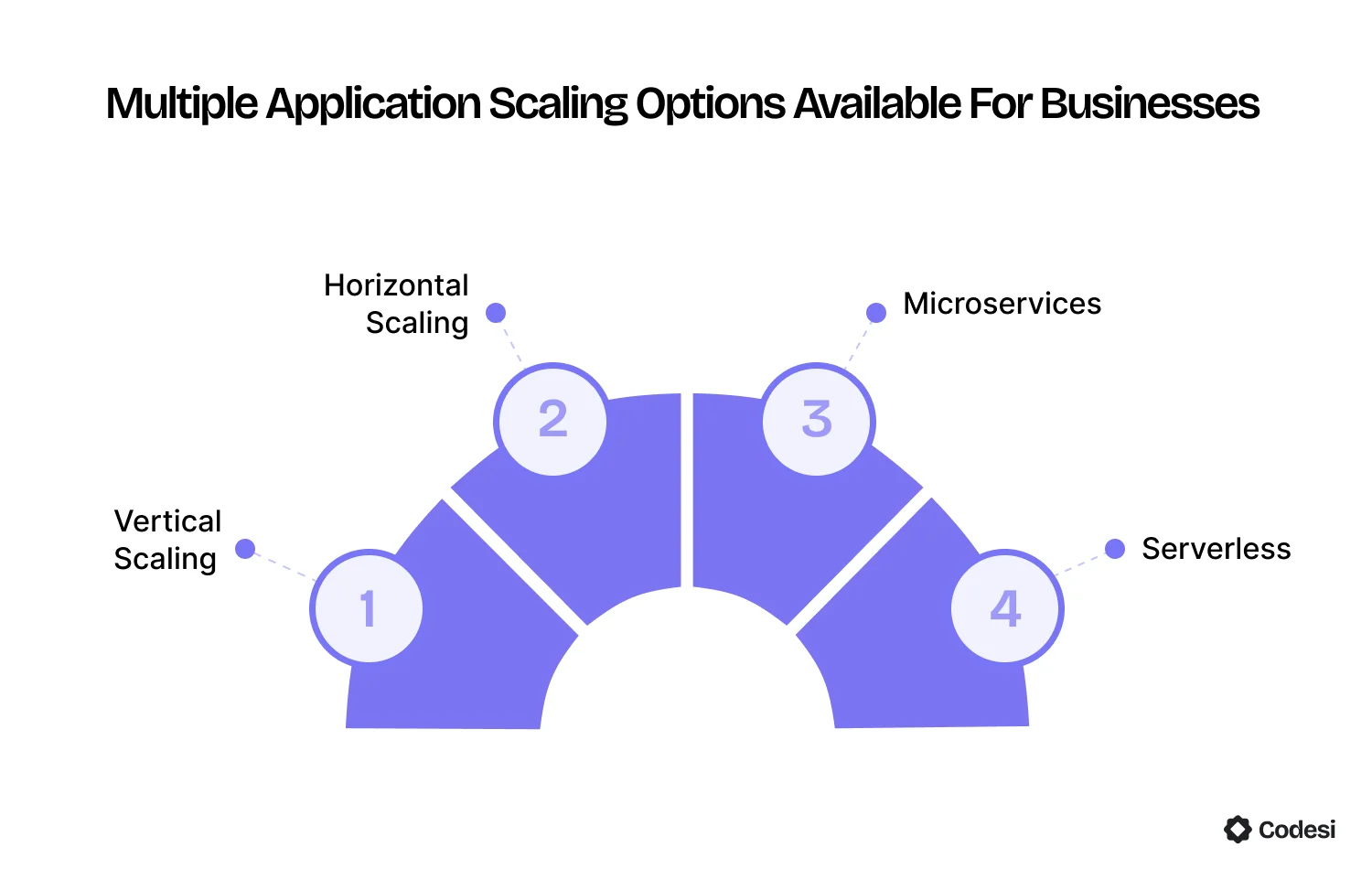
But as traffic increases and demands become more technical, such as supporting thousands of users, hosting large databases, or delivering custom logic in real-time, builders may become less accommodating.
Custom Website:
Developers usually build custom websites with growth in mind.
They structure everything from content delivery networks to modular code and cloud infrastructure to handle more users and features without slowing down. This approach makes the site faster, more stable, and ready to scale as your business grows.
Verdict:
For simple growth, builders hold their own. However, when your business requires high performance at scale, a custom solution provides more reliable infrastructure and adaptability.
7. Maintenance and Technical Oversight
Website Builder:
One of the most appealing aspects of using a website builder is the low-maintenance experience.
Platform providers handle all the technical heavy lifting, including security patches, server uptime, backups, and software updates, allowing you to focus on content, marketing, and operations.
Custom Website:
In contrast, a custom site requires ongoing attention.
Whether you handle it in-house or outsource to an agency, someone has to manage plugin updates, monitor site performance, address security concerns, and ensure compatibility as technologies evolve.
Verdict:
Website builders are the clear winner in terms of ease of maintenance. Custom sites offer more freedom, but they require planning and technical expertise to stay optimized and secure.
8. Ownership and Migration Control
Website Builder:
With a website builder, your site exists on the provider's platform.
While you can export content, the design and structure are often tied to proprietary systems, making it difficult to modify or adapt them.
If you ever want to migrate, it usually involves rebuilding the site from scratch elsewhere.
Custom Website:
A custom website grants you full ownership of the code, database, and hosting environment. You can change infrastructure providers, redesign without losing data, or evolve the platform as your needs shift.
Verdict:
If platform independence and data ownership are essential to your strategy, custom websites offer the freedom that off-the-shelf solutions cannot.
9. Security and Compliance
Website Builder:
Most builders offer solid baseline protection, including SSL certificates, automatic updates, and managed hosting environments. For general business use, that's usually enough.
However, when it comes to industry-specific compliance (such as HIPAA for healthcare or PCI-DSS for handling payments), builders often fall short.
Custom Website:
A custom site enables you to tailor your security infrastructure to meet stringent compliance standards. You can implement advanced encryption protocols, multi-factor authentication, region-specific data handling, and audit-ready activity logs.
This level of control is essential for businesses in regulated industries or those managing sensitive user information.
Verdict:
For general-purpose security, builders are sufficient. But if compliance is a legal or operational requirement, custom development becomes essential.
10. User Experience and Brand Differentiation
Website Builder:
Templates have come a long way. They're responsive, professionally designed, and easy to navigate.
But because many businesses use the same design framework, the user experience can feel repetitive. Visitors might not notice anything distinctive, but they also may not remember the site afterward.
Custom Website:
Designers craft every detail in a custom website, including transitions, animations, and navigation tone, to reinforce your brand identity.
You're creating an experience that feels personal, intuitive, and on-brand.
Verdict:
Builders provide safe and effective user experiences that work well for a wide range of use cases. However, when you want your brand to stand out and create a lasting impression, custom design provides the space to build something truly memorable.
Choosing the Right Fit: Website Builder or Custom Website?
Ultimately, the choice between a website builder and a custom website depends on your goals, timeline, and the level of involvement you want to have in the technical process.
Best Use Cases for Website Builders:
- Personal blogs, resumes, and creative portfolios that need a simple, polished presence.
- Local businesses looking for fast, low-maintenance websites.
- First-time entrepreneurs or solo founders launching side projects on a tight budget.
- Rapid MVPs, landing pages, or proof-of-concept sites that need to go live in hours, not weeks.
- Users with little to no technical experience who want a drag-and-drop solution without managing code or servers.
Best Use Cases for Custom Websites:
- Brands with a clear creative vision and design needs that go beyond template flexibility.
- E-commerce stores, SaaS platforms, and marketplaces requiring advanced backend logic or custom user flows.
- Businesses that rely on high-performance SEO, page speed, or data privacy to drive long-term growth.
- Companies needing integrations with internal systems (e.g. CRMs, ERPs, custom APIs).
- Organizations that expect significant traffic growth and need infrastructure built for scale and adaptability.
Bridging the Gap: How Codesi Combines the Best of Both Worlds
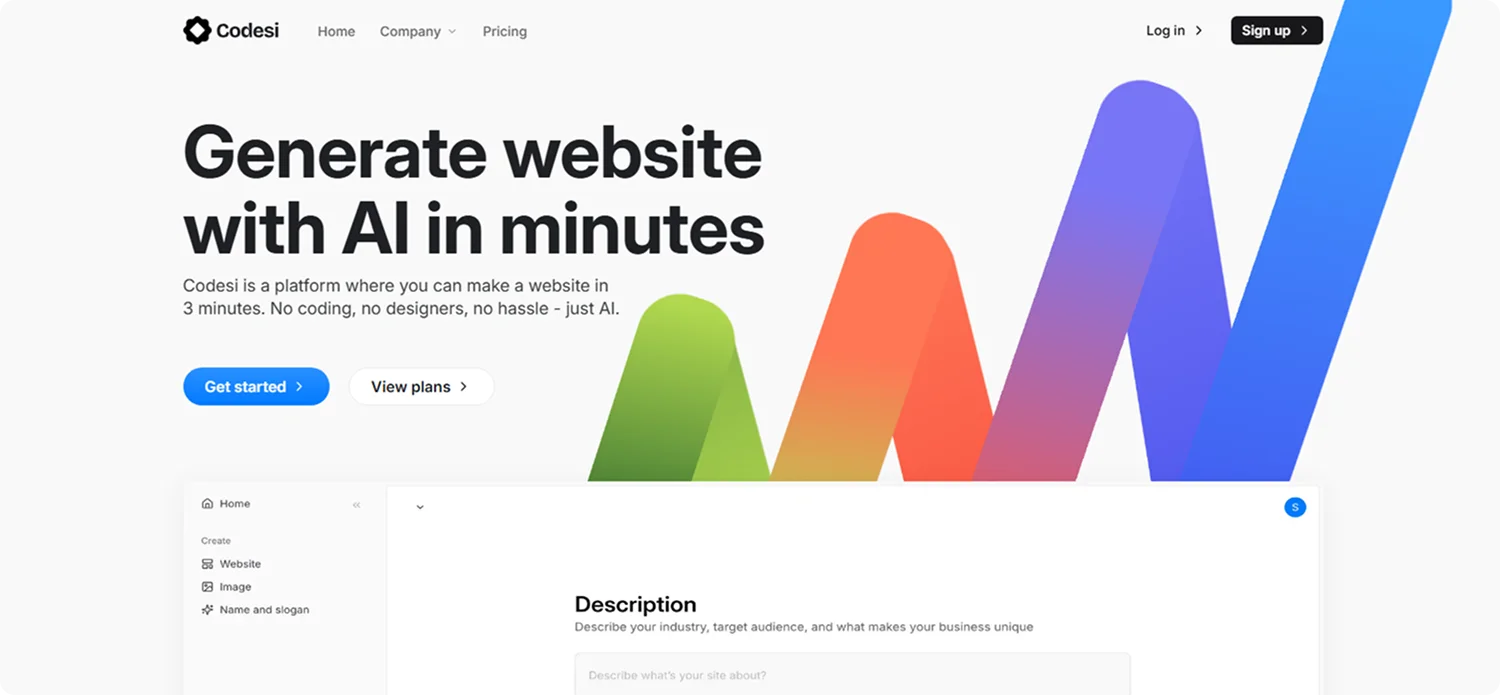
The website builder vs custom website debate doesn't have to end in compromise. With Codesi, you don't choose between speed and flexibility; you get both.
Built for modern startups, creators, and growing teams, Codesi utilizes AI to generate a unique, professional-grade website tailored entirely to your input. It's fast, fully customizable, and scalable, without sacrificing originality or control.
Here's what makes Codesi different:
- Launch in minutes: Skip the dev queue and go live in less than three minutes.
- No templates, no clones: Every site is uniquely generated from your business description.
- Real-time customization: Instantly tweak layout, copy, colors, and components, no code required.
- One-click publishing: Push your site live on a secure domain, with SSL and built-in hosting.
- Beginner-friendly interface: Perfect for solo founders, creators, and small teams with no tech background.
- Built to grow: Scalable infrastructure and security features support long-term business needs.
Stop choosing between speed and quality. Get both with Codesi.
Build a custom-grade website in minutes. No dev team. No delay. Just results.
Create your website with AI today
Codesi is a platform where you can make a website in 3 minutes.
No coding, no designers, no hassle - just AI.
